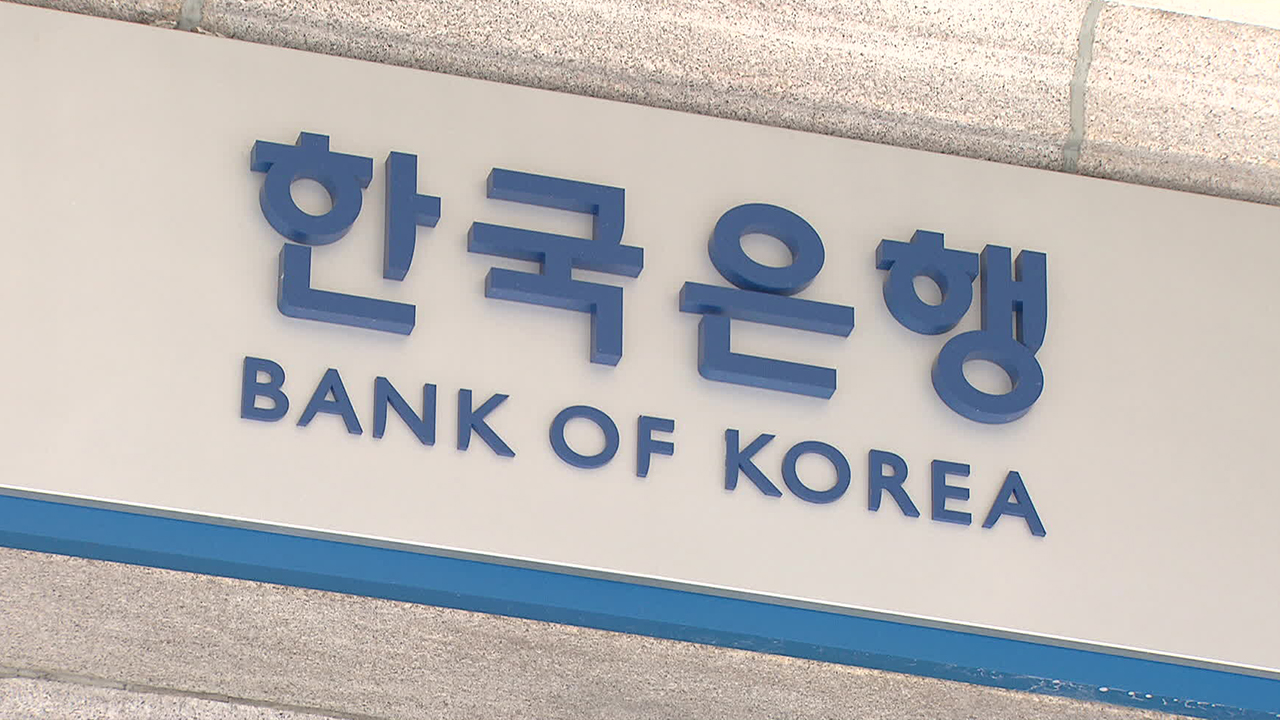BOK signals further rate cut amid uncertainties
입력 2024.12.25 (23:25)
읽어주기 기능은 크롬기반의
브라우저에서만 사용하실 수 있습니다.
[Anchor]
The Bank of Korea has announced that it will further lower the benchmark interest rate next year.
It is unusual for the central bank to explicitly state a rate cut in its monetary policy strategy report, but the decision appears to reflect concerns over political uncertainty and downside risks to the economy.
This is a report by reporter Lee Do-yoon.
[Report]
The Bank of Korea has indicated that it will lower interest rates through its monetary credit policy report for next year.
The bank stated that while maintaining stability in the inflation rate and alleviating downward pressures on growth, it will 'further lower' the interest rate.
The basis for this decision is the assessment that downward risks to the economy have increased due to rising political uncertainty and changes in the trade environment.
However, it is unusual for the Bank to announce a rate cut.
Even in 2020, when interest rates were lowered to the lowest level in history, it did not definitively state a reduction.
[Cho Young-moo/LG Economic Research Institute Researcher: "It can be interpreted that the Bank of Korea is beginning to worry that the economy may slow down further due to the impeachment situation and that active monetary easing is necessary."]
The issue is the extent and speed.
In this regard, Citibank has projected that the bank will lower rates in January, and if a rate cut occurs in January, it will be the first three consecutive rate cuts since the global financial crisis.
Bank of Korea Governor Lee Chang-yong has kept the possibility of an additional rate cut open but has shown a cautious stance regarding the timing and extent.
[Lee Chang-yong/Bank of Korea Governor/Dec. 18: "Of course, it is difficult to comment on January now because many new variables have emerged, and I have not yet officially discussed it with the monetary policy committee members...."]
The unfavorable domestic and external conditions for an additional rate cut are also variables.
The U.S. Federal Reserve has hinted at moderating the pace of its rate cuts, and the exchange rate, which has surged to the 1,450 won range—the highest level since 2009—remains a concern.
This is KBS News, Lee Do-yoon.
The Bank of Korea has announced that it will further lower the benchmark interest rate next year.
It is unusual for the central bank to explicitly state a rate cut in its monetary policy strategy report, but the decision appears to reflect concerns over political uncertainty and downside risks to the economy.
This is a report by reporter Lee Do-yoon.
[Report]
The Bank of Korea has indicated that it will lower interest rates through its monetary credit policy report for next year.
The bank stated that while maintaining stability in the inflation rate and alleviating downward pressures on growth, it will 'further lower' the interest rate.
The basis for this decision is the assessment that downward risks to the economy have increased due to rising political uncertainty and changes in the trade environment.
However, it is unusual for the Bank to announce a rate cut.
Even in 2020, when interest rates were lowered to the lowest level in history, it did not definitively state a reduction.
[Cho Young-moo/LG Economic Research Institute Researcher: "It can be interpreted that the Bank of Korea is beginning to worry that the economy may slow down further due to the impeachment situation and that active monetary easing is necessary."]
The issue is the extent and speed.
In this regard, Citibank has projected that the bank will lower rates in January, and if a rate cut occurs in January, it will be the first three consecutive rate cuts since the global financial crisis.
Bank of Korea Governor Lee Chang-yong has kept the possibility of an additional rate cut open but has shown a cautious stance regarding the timing and extent.
[Lee Chang-yong/Bank of Korea Governor/Dec. 18: "Of course, it is difficult to comment on January now because many new variables have emerged, and I have not yet officially discussed it with the monetary policy committee members...."]
The unfavorable domestic and external conditions for an additional rate cut are also variables.
The U.S. Federal Reserve has hinted at moderating the pace of its rate cuts, and the exchange rate, which has surged to the 1,450 won range—the highest level since 2009—remains a concern.
This is KBS News, Lee Do-yoon.
■ 제보하기
▷ 카카오톡 : 'KBS제보' 검색, 채널 추가
▷ 전화 : 02-781-1234, 4444
▷ 이메일 : kbs1234@kbs.co.kr
▷ 유튜브, 네이버, 카카오에서도 KBS뉴스를 구독해주세요!
- BOK signals further rate cut amid uncertainties
-
- 입력 2024-12-25 23:25:18

[Anchor]
The Bank of Korea has announced that it will further lower the benchmark interest rate next year.
It is unusual for the central bank to explicitly state a rate cut in its monetary policy strategy report, but the decision appears to reflect concerns over political uncertainty and downside risks to the economy.
This is a report by reporter Lee Do-yoon.
[Report]
The Bank of Korea has indicated that it will lower interest rates through its monetary credit policy report for next year.
The bank stated that while maintaining stability in the inflation rate and alleviating downward pressures on growth, it will 'further lower' the interest rate.
The basis for this decision is the assessment that downward risks to the economy have increased due to rising political uncertainty and changes in the trade environment.
However, it is unusual for the Bank to announce a rate cut.
Even in 2020, when interest rates were lowered to the lowest level in history, it did not definitively state a reduction.
[Cho Young-moo/LG Economic Research Institute Researcher: "It can be interpreted that the Bank of Korea is beginning to worry that the economy may slow down further due to the impeachment situation and that active monetary easing is necessary."]
The issue is the extent and speed.
In this regard, Citibank has projected that the bank will lower rates in January, and if a rate cut occurs in January, it will be the first three consecutive rate cuts since the global financial crisis.
Bank of Korea Governor Lee Chang-yong has kept the possibility of an additional rate cut open but has shown a cautious stance regarding the timing and extent.
[Lee Chang-yong/Bank of Korea Governor/Dec. 18: "Of course, it is difficult to comment on January now because many new variables have emerged, and I have not yet officially discussed it with the monetary policy committee members...."]
The unfavorable domestic and external conditions for an additional rate cut are also variables.
The U.S. Federal Reserve has hinted at moderating the pace of its rate cuts, and the exchange rate, which has surged to the 1,450 won range—the highest level since 2009—remains a concern.
This is KBS News, Lee Do-yoon.
The Bank of Korea has announced that it will further lower the benchmark interest rate next year.
It is unusual for the central bank to explicitly state a rate cut in its monetary policy strategy report, but the decision appears to reflect concerns over political uncertainty and downside risks to the economy.
This is a report by reporter Lee Do-yoon.
[Report]
The Bank of Korea has indicated that it will lower interest rates through its monetary credit policy report for next year.
The bank stated that while maintaining stability in the inflation rate and alleviating downward pressures on growth, it will 'further lower' the interest rate.
The basis for this decision is the assessment that downward risks to the economy have increased due to rising political uncertainty and changes in the trade environment.
However, it is unusual for the Bank to announce a rate cut.
Even in 2020, when interest rates were lowered to the lowest level in history, it did not definitively state a reduction.
[Cho Young-moo/LG Economic Research Institute Researcher: "It can be interpreted that the Bank of Korea is beginning to worry that the economy may slow down further due to the impeachment situation and that active monetary easing is necessary."]
The issue is the extent and speed.
In this regard, Citibank has projected that the bank will lower rates in January, and if a rate cut occurs in January, it will be the first three consecutive rate cuts since the global financial crisis.
Bank of Korea Governor Lee Chang-yong has kept the possibility of an additional rate cut open but has shown a cautious stance regarding the timing and extent.
[Lee Chang-yong/Bank of Korea Governor/Dec. 18: "Of course, it is difficult to comment on January now because many new variables have emerged, and I have not yet officially discussed it with the monetary policy committee members...."]
The unfavorable domestic and external conditions for an additional rate cut are also variables.
The U.S. Federal Reserve has hinted at moderating the pace of its rate cuts, and the exchange rate, which has surged to the 1,450 won range—the highest level since 2009—remains a concern.
This is KBS News, Lee Do-yoon.
-
-

이도윤 기자 dobby@kbs.co.kr
이도윤 기자의 기사 모음
-
이 기사가 좋으셨다면
-
좋아요
0
-
응원해요
0
-
후속 원해요
0










![[속보] 경남 김해에 시간당 70mm 이상 집중호우, <br>침수 주의](/data/news/2025/07/13/20250713_NQ5jSr.jpg)
![[단독] 위성락 실장 “전작권 협상 카드 아냐”…차관 인선 발표](/data/layer/904/2025/07/20250713_krfuHu.jpg)



이 기사에 대한 의견을 남겨주세요.